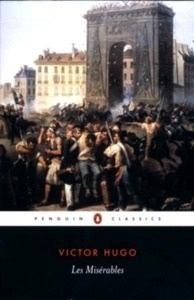Les Misérables

Editorial Penguin UK
Fecha de edición septiembre 2008
Idioma inglés
Traducción de Denny, Norman
EAN 9780140444308
Libro
Resumen del libro
Now a major musical film from Oscar-winning director Tom Hooper (The King's Speech), starring Hugh Jackman, Russell Crowe and Anne Hathaway, and also featuring Amanda Seyfreid, Helena Bonham-Carter and Sacha Baron-Cohen, Victor Hugo's Les Miserables is one of the great works of western literature. Now in a new translation from the French by Christine Donougher, Les Miserables is at once a thrilling narrative - part comedy, mystery, romance and tragedy - and a social document of France's turbulent revolutionary history. Victor Hugo's tale of injustice, heroism and love follows the fortunes of Jean Valjean (Hugh Jackman), an escaped convict determined to put his criminal past behind him.
But his attempts to become a respected member of the community are constantly put under threat: by his own conscience, when, owing to a case of mistaken identity, another man is arrested in his place; and by the relentless investigations of the dogged Inspector Javert (Russell Crowe). It is not simply for himself that Valjean must stay free, however, for he has sworn to protect the baby daughter of Fantine (Anne Hathaway), driven to prostitution by poverty. Victor Hugo (1802-85) wrote volumes of criticism, Romantic costume dramas, satirical verse and political journalism but is best remembered for his novels, especially Notre-Dame de Paris (1831), also known as The Hunchback of Notre-Dame and Les Miserables (1862) which was adapted into one of the most successful musicals of all time.
'All human life is here' Cameron Mackintosh, producer of the musical Les Miserables 'One of the half-dozen greatest novels of the world' Upton Sinclair 'A great writer - inventive, witty, sly, innovatory' A. S. Byatt, author of Possession
Biografía del autor
x{0026}lt;P x{0026}lt;B Victor Hugox{0026}lt;/B (1802-1885) nació en Besançon, Francia. Educado en escuelas privadas de París, empezó a escribir siendo muy joven. Poeta, novelista y dramaturgo, llevó a sus obras su espíritu inconformista, que sazonó con grandes dosis de sentimentalismo y anécdotas históricas. En sus obras, exponentes máximos del romanticismo literario, siempre volcó su ideologíaliberal, que le obligó a exiliarse de su país en más de una ocasión. Tras el volumen de poesía x{0026}lt;I Odas y poesías diversasx{0026}lt;/I (1822), las novelas x{0026}lt;I Han de Islandiax{0026}lt;/I (1823) y x{0026}lt;I Bug-Jargalx{0026}lt;/I (1824), y los poemas de x{0026}lt;I Odas y baladasx{0026}lt;/I (1826), escribió x{0026}lt;I Cromwellx{0026}lt;/I (1827), extenso drama histórico, y x{0026}lt;I Marion de Lormex{0026}lt;/I (1829), obra teatral censuradapor ser demasiado liberal. Pero no fue hasta 1830, con la publicación y el estreno de x{0026}lt;I Hernanix{0026}lt;/I , posteriormente adaptada por Verdi, cuando logró el reconocimiento del público y de la crítica. A x{0026}lt;I Hernani x{0026}lt;/I siguieron la novela x{0026}lt;I Notre-Dame de Parísx{0026}lt;/I (1831), la obra teatral x{0026}lt;I El rey sediviertex{0026}lt;/I (1832, adaptada por Verdi en x{0026}lt;I Rigolettox{0026}lt;/I ), x{0026}lt;I Lucrecia Borgiax{0026}lt;/I (1833), x{0026}lt;I Claude Gueuxx{0026}lt;/I (1834), x{0026}lt;I Ruy Blasx{0026}lt;/I (1838) y x{0026}lt;I Les Burgravesx{0026}lt;/I (1843), también obra teatral, que le supusieron su ingreso en la Academia Francesa en 1841. Durante el Segundo Imperio emigró a Bélgica, donde escribió la sátira x{0026}lt;I Napoleón el pequeñox{0026}lt;/I (1852), el poema épico x{0026}lt;I La leyenda de los siglosx{0026}lt;/I (1859-1883) y terminó la que sería su obra más extensa y famosa, x{0026}lt;I Los miserablesx{0026}lt;/I (1862). Regresó a Francia en 1870, donde siguió publicando: x{0026}lt;I El noventa y tresx{0026}lt;/I (1874) y x{0026}lt;I El arte de ser abuelox{0026}lt;/I (1877). Murió en París, y sus restos fueron expuestos en el Arco de Triunfo y luego trasladados al Panteón, donde fue sepultado junto a las mayores celebridades francesas.x{0026}lt;/P








